- Events & Programs Home
- Calendar
- Accessibility
- Adults
-
Families & Teens
- Families & Teens Home
- 10x10 Teen Art Expo
- Art on the Rise
- Art Together: Art Making for Families with Children Ages 3–5
- Babies Sing with May Festival Minis
- Boy Scouts / Girl Scouts
- CAM Kids Day
- Family Storytime and Gallery Walk
- Family Studio: Art Making for Families with Children Ages 6–12
- Games in the Galleries
- Members-Only Baby Tours
- Public Baby Tours
- REC Reads
- Rosenthal Education Center (REC)
- Saturday Morning Art Class
- See Play Learn Kits
- Summer Camp
- Teen Fest: Zine and Comic Exchange
- RECreate
- Teachers
- Community Outreach
- Fundraisers
- Plan Your Own Event

- Events & Programs Home
- Calendar
- Accessibility
- Adults
-
Families & Teens
- Families & Teens Home
- 10x10 Teen Art Expo
- Art on the Rise
- Art Together: Art Making for Families with Children Ages 3–5
- Babies Sing with May Festival Minis
- Boy Scouts / Girl Scouts
- CAM Kids Day
- Family Storytime and Gallery Walk
- Family Studio: Art Making for Families with Children Ages 6–12
- Games in the Galleries
- Members-Only Baby Tours
- Public Baby Tours
- REC Reads
- Rosenthal Education Center (REC)
- Saturday Morning Art Class
- See Play Learn Kits
- Summer Camp
- Teen Fest: Zine and Comic Exchange
- RECreate
- Teachers
- Community Outreach
- Fundraisers
- Plan Your Own Event
Blog: CAM Uncovered
Blog: CAM Uncovered
- Home
- Plan Your Visit
- Art
-
Events & Programs
- Events & Programs Home
- Calendar
- Accessibility
- Adults
-
Families & Teens
- Families & Teens Home
- 10x10 Teen Art Expo
- Art on the Rise
- Art Together: Art Making for Families with Children Ages 3–5
- Babies Sing with May Festival Minis
- Boy Scouts / Girl Scouts
- CAM Kids Day
- Family Storytime and Gallery Walk
- Family Studio: Art Making for Families with Children Ages 6–12
- Games in the Galleries
- Members-Only Baby Tours
- Public Baby Tours
- REC Reads
- Rosenthal Education Center (REC)
- Saturday Morning Art Class
- See Play Learn Kits
- Summer Camp
- Teen Fest: Zine and Comic Exchange
- RECreate
- Teachers
- Community Outreach
- Fundraisers
- Plan Your Own Event
- Give & Join
- About
- Tickets
- Calendar
- Exhibitions
- Collections
- Blog
- Shop
Behind the Scenes in Curatorial: High Style Fashion in the Works
by Cynthia Amnéus
10/20/2015
curatorial , fashion , Fashion Arts & Textiles , behind the scenes , exhibition design , exhibitions , installation , in the galleries

Opening on November 7, our next fashion exhibition, High Style: Twentieth-Century Masterworks from the Brooklyn Museum Costume Collection, features garments and accessories from 1900 to 1980 designed by French couturiers and pioneering American fashion designers. This traveling exhibition comes to us from the Metropolitan Museum of Art and, while it may seem like presenting an exhibition that has been organized by another institution is an easy task, there is still a lot to be done behind the scenes. On the curatorial end, checklists are reviewed, label copy is revised, and our galleries need to be redesigned and reconfigured for each new exhibition. High Style is no exception.
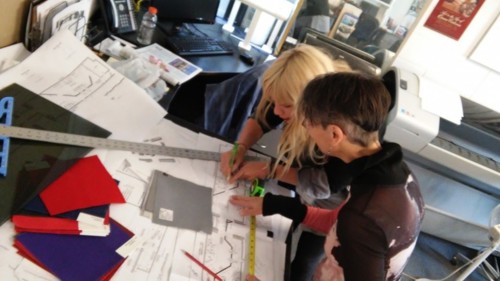
I worked closely with exhibition designer, Chrystal Roggenkamp, over a period of months to design the space and present the garments and accessories in an engaging way that also keeps the objects safe. The final design was sent to the MET for approval. The objects are grouped in five sections—early and late French couture, American women designers, American men designers, and a special section devoted to designer Charles James.
Fashion exhibitions require platforms—and lots of them. Once the space is designed, the carpenters (and their tools) move into the galleries and begin building walls, platforms, and cases. The Western Southern Gallery will be completely reconfigured and look totally different from our last exhibition.
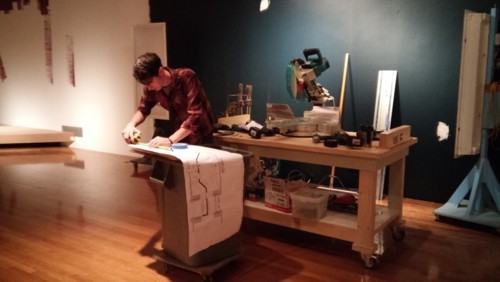 Carpenter Scott Budd studies the construction plan.
Carpenter Scott Budd studies the construction plan.
Dry wall is hung and painting begins—a task that needs to be completed before any artwork is taken into the galleries, giving the paint time to off-gas any harmful chemicals.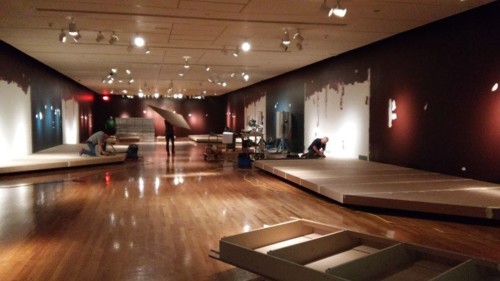
Dry wall is hung and painting begins—a task that needs to be completed before any artwork is taken into the galleries, giving the paint time to off-gas any harmful chemicals.
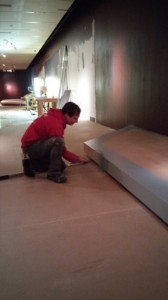
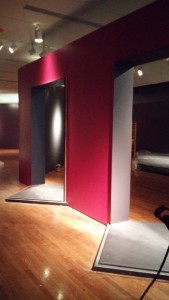
CAM painter, Joshua Rectenwald Jewel boxes for featured items
For this show, we have created what we are calling ‘jewel boxes.’ Garments and accessories that I want to highlight will be shown in these angular Plexiglas cases inset into the walls. Featured objects include a hand embroidered gown from the 1920s by French couturier Jeanne Lanvin and necklaces by Italian designer Elsa Schiaparelli.
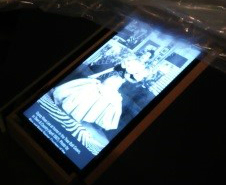
Even our IT department is involved in this installation as there are some high-tech animation screens built into the platforms that explore in depth the details of Charles James’s most important innovations.
Analytic animations by Diller Scofidio + Renfro, originally produced for the Metropolitan Museum of Art exhibitionCharles James: Beyond Fashion (2014), for of which will be on display here.
Once the space is complete and clean, the objects will be dressed and installed by couriers who will travel to Cincinnati from the MET. The couriers are knowledgeable about these particular objects and skilled in handling fragile garments and accessories. When you come to the exhibition, you will notice the galleries are dimly lit. Textiles are light sensitive, which means we need to keep the light levels low to preserve these objects for future generations.
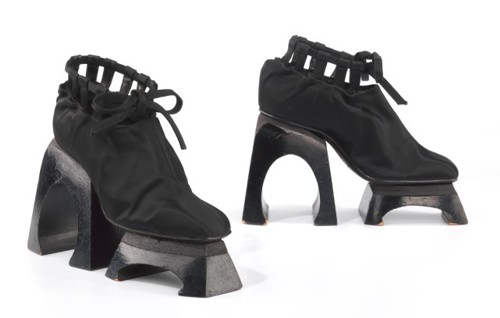
House of Balenciaga (French, founded 1937); Steven Arpad (French, born Hungary, 1904-
1999), Evening Shoes, 1938‑39, Brooklyn Museum Costume Collection at The Metropolitan Museum of Art, Gift of the Brooklyn Museum, 2009; Brooklyn Museum Collection (2009.300.1394a, b) Image © The Metropolitan Museum of Art
I hope this teaser . . . an amazing pair of shoes from the 1930s by designer Stephen Arpad. . . convinces you that if you are a fashionista (or even an architect or engineer) you do not want to miss this exhibition! Both the objects and the design of the space are exceptional. The most renowned designers of the twentieth century are featured, alongside sculptural ball gowns by the great American couturier, Charles James. High Style: Twentieth-Century Masterworks from the Brooklyn Museum Costume Collection will be on view Nov. 7, 2015 through Jan. 24, 2016.
Featured image credit:
Arnold Scaasi (American, born Canada, 1931), Evening Ensemble, detail, 1983, Brooklyn Museum Costume Collection at The Metropolitan Museum of Art, Gift of the Brooklyn Museum, 2009; Gift of Mrs. William Randolph Hearst, Jr., 1991 (2009.300.1063a,b) Image © The Metropolitan Museum of Art
Cincinnati, OH 45202
Toll Free: 1 (877) 472-4226
Museum Hours
Museum Shop
Terrace Café
Library
Cincinnati Art Museum is supported by the tens of thousands of people who give generously to the annual ArtsWave Campaign, the region's primary source for arts funding.

Free general admission to the Cincinnati Art Museum is made possible by a gift from the Rosenthal Family Foundation. Exhibition pricing may vary. Parking at the Cincinnati Art Museum is free.
Generous support for our extended Thursday hours is provided by Art Bridges Foundation’s Access for All program.

General operating support provided by:



